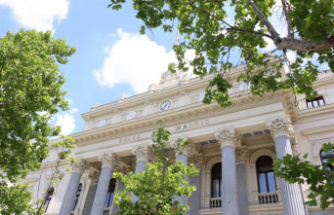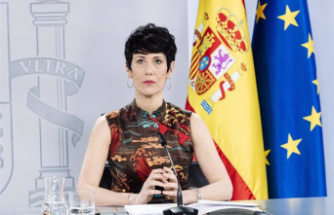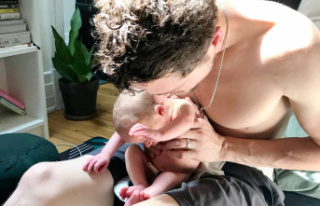Those who go on vacation while Quebec is experiencing a significant increase in COVID cases must review the way they plan them or find plans B.
• Read also: COVID-19: more and more Quebecers are getting rapid tests
• To read also: A cat would have given the COVID to a veterinarian
• Read also: Pandemic management: the PQ calls for the appointment of an independent scientific observer
“We have cases, for example, of families who were to go abroad in the coming days. But since some have COVID, we were able to move their trip, since they had planned for it by taking out insurance, ”says Tina Beaulieu, owner of the Travel N. T. Air agency, in Montreal.
For the past few weeks, Quebec has recorded a sharp increase in cases and deaths linked to COVID-19. Hospitalizations again exceeded the 1,500 mark.
Thursday, at a press conference, the Minister of Health, Christian Dubé, and the director of public health, Dr. Luc Boileau, hammered home that Quebecers must continue to respect the instructions for isolation to prevent contagion.
“It is certain that we have more cases than last year because there are more transmissions because of the B.4 and B.5 variants and fewer measures”, notes the professor at the School of public health from the University of Montreal, Benoît Mâsse.
And at the start of the summer period, Quebecers who go on vacation or plan to do so are not spared from infections.
better prepared
But after two years of the pandemic, however, they seem to be much better prepared to turn around in the event of an infection.
“We suggest that our customers take out travel insurance to prevent them from losing it. Between COVID and the problem of passports, it has become unavoidable, ”explains Stéphanie Reilly, of the company Voyages Jean-Pierre, in Brossard, on the South Shore of Montreal.
Many customers book more at the last minute to make sure they don't get canceled or changed, she adds.
Travel differently
Holidaymakers must also learn to travel and prepare differently to avoid unpleasant surprises at the airport, since they must now comply with the entry conditions which differ in each country.
“We see that people are very anxious and want to be sure to have everything in hand before leaving,” says Ms. Reilly.
As with Voyages Jean-Pierre, questions and calls from travelers concerning health measures abroad are coming from the agencies.
“With the start of the holidays, we really see an increase in calls, that represents about 50% of calls,” explains Marina Fortin, owner of the M Voyages Rimouski agency, in Bas-Saint-Laurent.
To avoid headaches, most companies offer some kind of checklist.
“When booking, I always give a list of things to check and, 72 hours before their departure, I contact them again to check with them that they are up to date for everything depending on their destination,” says Tina Beaulieu. , owner of the Voyage N.T. Air agency in Montreal.
Travel to Canada
Proof of vaccination is no longer required when boarding a train or plane within Canada. However, you must meet certain requirements such as showing no signs or symptoms of COVID-19 and wearing a mask during the trip.
You may not be able to board a train or plane if you have symptoms, unless you have a medical certificate confirming that they are not related to COVID-19, or you present a negative PCR test.
Trip abroad
For people traveling, you may need to present proof of vaccination or a negative PCR test.
Example: France requires adults over 18 to have a booster dose no later than nine months after the second dose of a COVID-19 vaccine. People who have not been inoculated must provide a PCR test less than 72 hours or an antigen test less than 48 hours before departure.
To find out about the requirements for each country, you can consult the Government of Canada's "Travel advice and advisories by destination" page (travel.gc.ca/travelling/advisories).
People who have not received two doses of vaccines will have to present a negative screening test before boarding the plane, undergo a screening test when they return to Canada and must quarantine for 14 days.
Test PCR
Some countries, such as Bulgaria, South Korea, India or Cameroon, ask all their visitors to present a negative screening test to return to the country, even if they have a complete vaccination schedule.
In most European countries, unvaccinated people must also show a screening test in order to cross the border.
In Quebec, private companies perform these tests and some pharmacies also offer the service. It is generally necessary to make an appointment online, in particular on the Clic-Santé platform.
Not all countries accept the same tests, so check if the country you are visiting requires a PCR or antigen test.
ArriveCan
The use of the Canadian federal government application remains mandatory. All returning travelers, citizens or not, must provide the requested information within 72 hours of their return, such as proof of vaccination, information related to the trip made or the quarantine plan.
Without proof of file on ArriveCan, travelers face a fine of $5,000.
positive abroad
If you have contracted COVID-19 during your trip within 10 days of your return to the country, you will not be able to fly. You will therefore have to follow the instructions of the country in which you are, for example whether or not to submit to quarantine. You will have to wait until you have a negative screening result for COVID-19 to be able to return to Canada, explains Health Canada.
Vaccination
People who wish to obtain a 3rd dose (booster dose) for COVID-19 can still make an appointment on the Clic-Santé platform.
Appointments for a 4th dose are already offered to all people over the age of 18 who received their last dose at least three months ago, as well as immunocompromised and dialysis people over the age of 12.
Isolation
In Quebec, the government requires that you isolate yourself immediately in the event of a fever.
If you have COVID, you must self-isolate for five days as soon as symptoms appear or when you test positive. After this time, if the symptoms and the fever disappear for 24 hours, you can resume your activities: by wearing a mask;
Unvaccinated people, however, must self-isolate for 5 days.
Rapid tests
Quebecers can always pick up a box of rapid screening tests at the pharmacy by booking an appointment on the Clic-Santé platform or by going to the counter.
Each adult is entitled to receive a box of five free tests every 30 days upon presentation of their RAMQ card.
Although "imperfect", these tests are effective in detecting COVID-19 infection, despite the arrival of new variants.
"If the test is negative, but you still have symptoms, you have to be careful and have a little consideration for others [by isolating yourself]", explains professor at McGill University, David Juncker, adding to redo a test within 24 or 48 hours.
– With Hugo Duchaine













